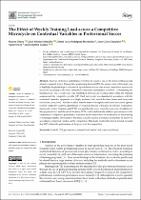Please use this identifier to cite or link to this item:
https://repositorio.usj.es/handle/123456789/608
| Title: | Article The Effect of Weekly Training Load across a Competitive Microcycle on Contextual Variables in Professional Soccer |
| Authors: | Chena Sinovas, Marcos


Morcillo, José Alfonso 
Rodríguez-Hernández, María Luisa 
Zapardiel, Juan Carlos 


Owen, Adam Lee 
Lozano, Demetrio 


|
| Keywords: | Football; GPS; Performance; External load; Match load; Contextual factors |
| Issue Date: | 11-May-2021 |
| Publisher: | MDPI AG |
| Citation: | Chena, M.; Morcillo, J.A.; Rodríguez-Hernández, M.L.; Zapardiel, J.C.; Owen, A.; Lozano, D. The Effect of Weekly Training Load across a Competitive Microcycle on Contextual Variables in Professional Soccer. Int. J. Environ. Res. Public Health 2021, 18, 5091. https://doi.org/10.3390/ijerph18105091 |
| Abstract: | Analysis of the key performance variables in soccer is one of the most continuous and attractive research topics. Using global positioning devices (GPS), the primary aim of this study was to highlight the physiological response of a professional soccer team across competitive microcycles in-season according to the most influential contextual performance variables. Determining the training load (TL), a work ratio was established between all recorded data within the training sessions and the competitive profile (CP). Each microcycle was classified in accordance with the contextual variables: opponent level (high, medium, low), match location (home and away) and score (win, draw, lose). Results revealed that the team were significantly more successful (games won) in competitive games against high-level opponents and when played at home. Cumulative microcycle/weekly training load (WTL) was significantly lower when the team won. In addition to the opponent level and the match location, WTL could condition the athlete’s performance in the competition. Competitive performance responses are the main source of information for the planning of training programs. The results of this study could be used as a reference to structure TL and WTL according to contextual variables in the competition. This study, which is the first of its kind, revealed that WTL effects the performance of the players in the competition. |
| URI: | https://repositorio.usj.es/handle/123456789/608 |
| ISSN: | 1661-7827 |
| Appears in Collections: | Artículos de revistas |
Files in This Item:
| File | Description | Size | Format | |
|---|---|---|---|---|
| The effect of weekly training load across a competitive microcycle on contextual variables in professional soccer.pdf | 1,55 MB | Adobe PDF |  View/Open |
This item is licensed under a Creative Commons License

